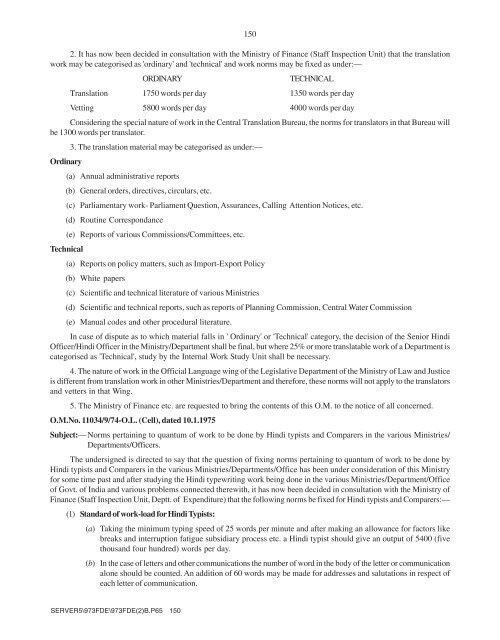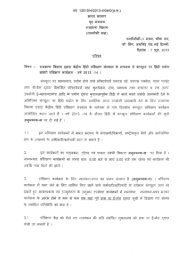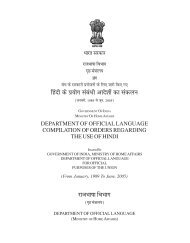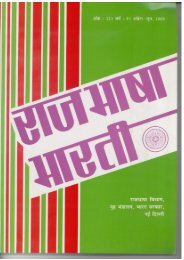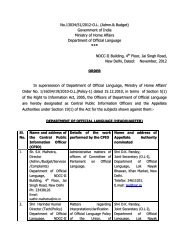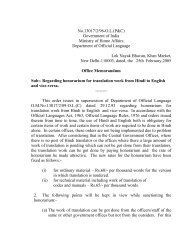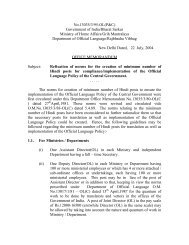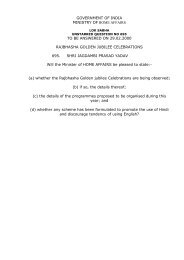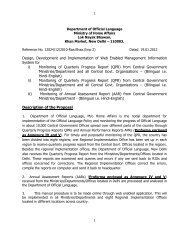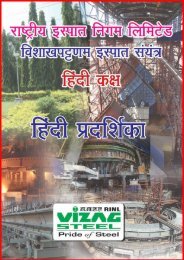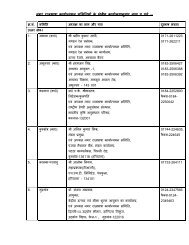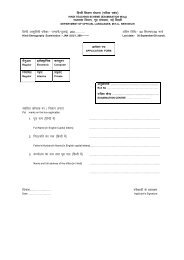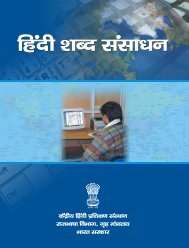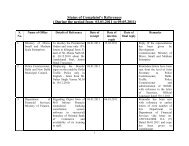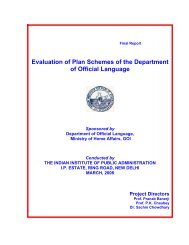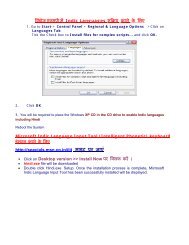fganh ds iz;ksx laca/kh vkns'kksa dk ladyu jktHkk"kk foHkkx
fganh ds iz;ksx laca/kh vkns'kksa dk ladyu jktHkk"kk foHkkx
fganh ds iz;ksx laca/kh vkns'kksa dk ladyu jktHkk"kk foHkkx
You also want an ePaper? Increase the reach of your titles
YUMPU automatically turns print PDFs into web optimized ePapers that Google loves.
SERVER5\973FDE\973FDE(2)B.P65 150<br />
150<br />
2. It has now been decided in consultation with the Ministry of Finance (Staff Inspection Unit) that the translation<br />
work may be categorised as 'ordinary' and 'technical' and work norms may be fixed as under:—<br />
ORDINARY TECHNICAL<br />
Translation 1750 wor<strong>ds</strong> per day 1350 wor<strong>ds</strong> per day<br />
Vetting 5800 wor<strong>ds</strong> per day 4000 wor<strong>ds</strong> per day<br />
Considering the special nature of work in the Central Translation Bureau, the norms for translators in that Bureau will<br />
be 1300 wor<strong>ds</strong> per translator.<br />
3. The translation material may be categorised as under:—<br />
Ordinary<br />
(a) Annual administrative reports<br />
(b) General orders, directives, circulars, etc.<br />
(c) Parliamentary work- Parliament Question, Assurances, Calling Attention Notices, etc.<br />
(d) Routine Correspondance<br />
(e) Reports of various Commissions/Committees, etc.<br />
Technical<br />
(a) Reports on policy matters, such as Import-Export Policy<br />
(b) White papers<br />
(c) Scientific and technical literature of various Ministries<br />
(d) Scientific and technical reports, such as reports of Planning Commission, Central Water Commission<br />
(e) Manual codes and other procedural literature.<br />
In case of dispute as to which material falls in ' Ordinary' or 'Technical' category, the decision of the Senior Hindi<br />
Officer/Hindi Officer in the Ministry/Department shall be final, but where 25% or more translatable work of a Department is<br />
categorised as 'Technical', study by the Internal Work Study Unit shall be necessary.<br />
4. The nature of work in the Official Language wing of the Legislative Department of the Ministry of Law and Justice<br />
is different from translation work in other Ministries/Department and therefore, these norms will not apply to the translators<br />
and vetters in that Wing.<br />
5. The Ministry of Finance etc. are requested to bring the contents of this O.M. to the notice of all concerned.<br />
O.M.No. 11034/9/74-O.L. (Cell), dated 10.1.1975<br />
Subject:— Norms pertaining to quantum of work to be done by Hindi typists and Comparers in the various Ministries/<br />
Departments/Officers.<br />
The undersigned is directed to say that the question of fixing norms pertaining to quantum of work to be done by<br />
Hindi typists and Comparers in the various Ministries/Departments/Office has been under consideration of this Ministry<br />
for some time past and after studying the Hindi typewriting work being done in the various Ministries/Department/Office<br />
of Govt. of India and various problems connected therewith, it has now been decided in consultation with the Ministry of<br />
Finance (Staff Inspection Unit, Deptt. of Expenditure) that the following norms be fixed for Hindi typists and Comparers:—<br />
(1) Standard of work-load for Hindi Typists:<br />
(a) Taking the minimum typing speed of 25 wor<strong>ds</strong> per minute and after making an allowance for factors like<br />
breaks and interruption fatigue subsidiary process etc. a Hindi typist should give an output of 5400 (five<br />
thousand four hundred) wor<strong>ds</strong> per day.<br />
(b) In the case of letters and other communications the number of word in the body of the letter or communication<br />
alone should be counted. An addition of 60 wor<strong>ds</strong> may be made for addresses and salutations in respect of<br />
each letter of communication.


